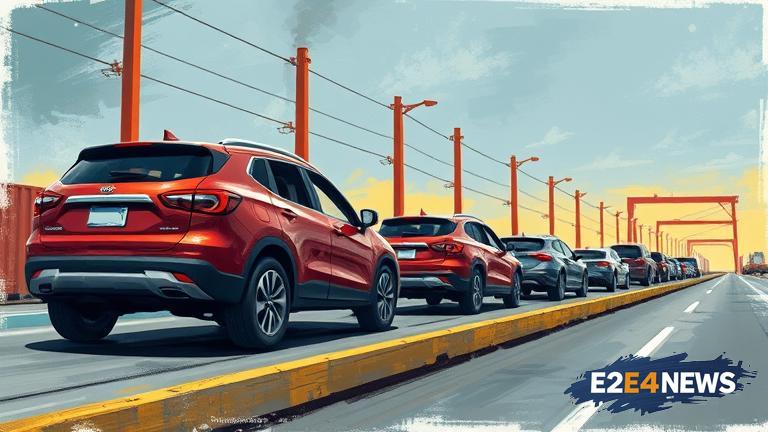The global auto supply chain, a complex network of manufacturers, suppliers, and logistics providers, is facing a significant threat from the tariffs imposed by US President Donald Trump. The tariffs, which target imported goods from countries such as China, Mexico, and Canada, have already started to take a toll on the industry. Many automakers and suppliers have expressed concerns about the impact of the tariffs on their businesses, citing increased costs, reduced profitability, and potential job losses. The tariffs have also led to a decline in investor confidence, with many investors pulling out of the industry due to the uncertainty and volatility created by the trade tensions. Furthermore, the tariffs have disrupted the global supply chain, with many companies struggling to adapt to the new trade landscape. The auto industry is a significant contributor to the global economy, with millions of jobs and billions of dollars in revenue at stake. The tariffs have also sparked fears of a global trade war, which could have far-reaching consequences for the industry and the broader economy. In addition, the tariffs have raised concerns about the potential for retaliatory measures from other countries, which could further exacerbate the situation. The auto industry is highly dependent on international trade, with many companies relying on imported components and materials to manufacture their vehicles. The tariffs have made it more expensive for these companies to import the necessary components, which has led to increased costs and reduced profitability. Many companies are also struggling to find alternative suppliers, which has disrupted the global supply chain and led to delays and shortages. The tariffs have also had a significant impact on the US auto industry, with many companies expressing concerns about the potential for job losses and plant closures. The US is a significant player in the global auto industry, with many major automakers and suppliers based in the country. The tariffs have also sparked concerns about the potential for a decline in US auto exports, which could have significant consequences for the industry and the broader economy. In recent years, the global auto industry has become increasingly interconnected, with many companies relying on international trade to manufacture and sell their vehicles. The tariffs have disrupted this interconnectedness, with many companies struggling to adapt to the new trade landscape. The auto industry is also a significant contributor to many national economies, with millions of jobs and billions of dollars in revenue at stake. The tariffs have raised concerns about the potential for a decline in economic growth, with many countries expressing concerns about the impact of the tariffs on their economies. The global auto supply chain is a complex and interconnected network, with many companies relying on each other to manufacture and sell their vehicles. The tariffs have disrupted this network, with many companies struggling to adapt to the new trade landscape. The auto industry is also a significant contributor to many local economies, with many companies relying on local suppliers and manufacturers to produce their vehicles. The tariffs have raised concerns about the potential for a decline in local economic growth, with many communities expressing concerns about the impact of the tariffs on their local economies. The global auto industry is facing a significant challenge from the tariffs, with many companies struggling to adapt to the new trade landscape. The tariffs have also sparked concerns about the potential for a decline in innovation and investment in the industry, with many companies expressing concerns about the impact of the tariffs on their research and development activities. The auto industry is a significant contributor to many national and local economies, with millions of jobs and billions of dollars in revenue at stake. The tariffs have raised concerns about the potential for a decline in economic growth, with many countries expressing concerns about the impact of the tariffs on their economies.
